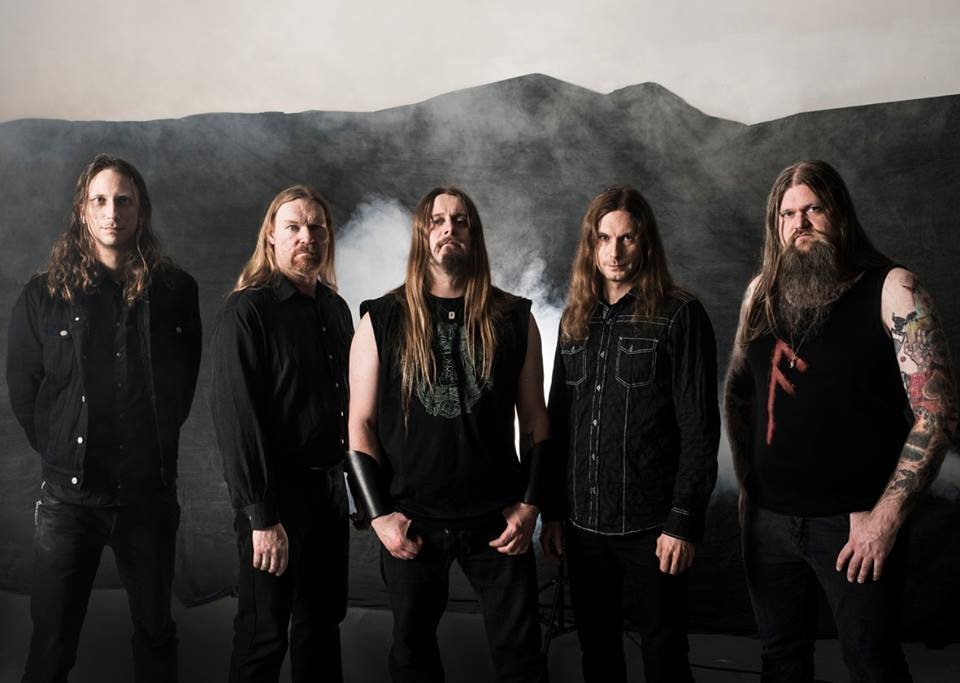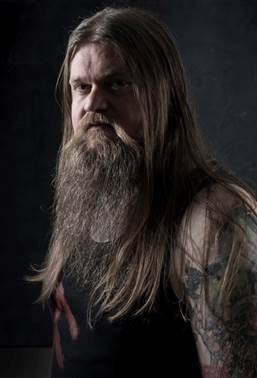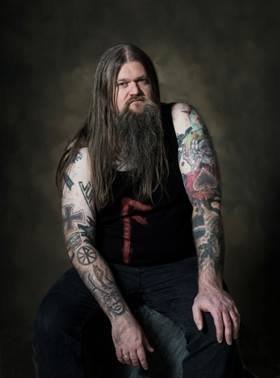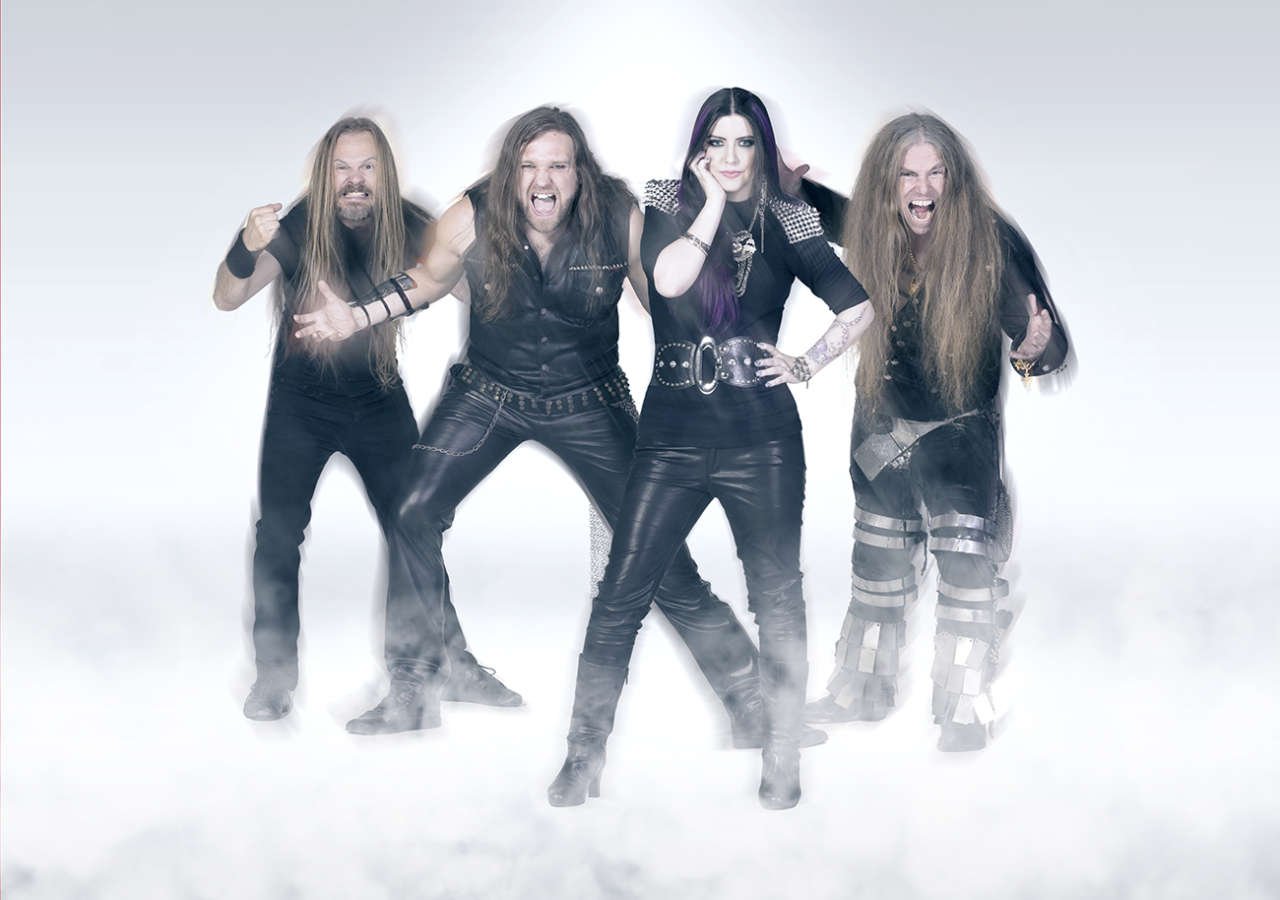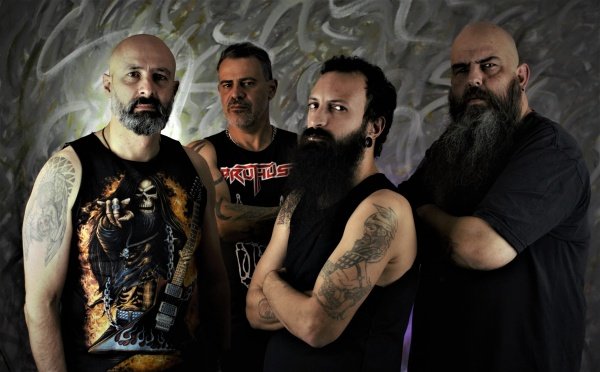Prestes a lançar o 13º álbum de estúdio, In Times, Ivar Bjørnson, vocalista do Enslaved, concedeu uma entrevista ao Portal do Inferno, onde comentou sobre a concepção e o processo de composição do disco. O músico falou também da evolução da banda e da participação na 15ª edição do Inferno Metal festival, um dos mais importantes festivais da Noruega. A data também marca o começo das comemorações dos 25 anos da banda. Confira:
**Scroll down to read the English version**
Portal do Inferno: Vocês estão prestes a lançar seu 13º álbum, In Times, como você descreve o clima atual da banda?
Ivar Bjørnson: Eu acho que nunca estivemos num melhor momento como estamos agora. A formação atual está estável desde 2003. Depois de ter tocado em muitas turnês, nós nos conhecemos muito bem. In Times simboliza o fato de que agora realmente começamos a nos utilizar mutuamente, no sentido de que todo mundo está tentando fazer com que cada um de nós se torne melhor. Isso cria uma atmosfera muito saudável na banda, soa como o típico regime socialista escandinavo (risos!), mas também é uma forma muito eficiente para a banda melhorar. É um sentimento extremamente coletivo baseado nos interesses da banda, ao invés de performances individuais, isso nos faz soar melhor tanto no estúdio quanto ao vivo. Nós estamos na nossa melhor hora.
P.I.: Você começou essa jornada maravilhosa quando você tinha apenas 13 anos. Você já tinha ideia, naquela época, que a música se tornaria a sua profissão?
Ivar: Eu me lembro claramente que naquela época, estar em uma banda e sentir tudo aquilo era inovador, não necessariamente em um nível internacional, mas para nós mesmos. Sentimos que estávamos dando esses grandes passos e que estávamos definindo o nosso próprio som, era muito libertador. Nós não inventamos nada novo, mas criar algo do nada foi uma realização muito importante para nós. Éramos nós mesmos, com a empolgação de todas as influências que ouvíamos, como bandas da Grécia, como o Rotting Christ, e da Itália, como o Monumentum. Não é como hoje com a internet quando você pode ouvir uma banda nova imediatamente, naquela época, trocando fitas, você conseguia os lançamentos por correspondência e era sempre algo que você nunca tinha ouvido antes. Toda essa exploração foi alucinante. Ao mesmo tempo, tínhamos todas as dúvidas sobre o nosso futuro. Nós nunca deixamos a escola e ainda tínhamos alguns planos para nossa educação. Eu ainda estava trabalhando na minha educação até meus 24-25 anos, até perceber que seria um músico.
P.I.: Isa e Ruun, seus oitavo e nono álbuns, respectivamente, mostraram a chegada das raízes do black metal tradicional. Na sua opinião, quais são as principais características que o seu último trabalho, In Times, trás em termos de evolução do estilo musical da banda?
Ivar: Depois dos primeiros álbuns, havia uma certa reação do nosso lado, não contra o que estávamos fazendo, mas em determinado momento eu senti que o black metal estava correndo atrás do próprio rabo ao invés de se desenvolver artisticamente. Muita gente sentiu a necessidade de sair da cena, com medo de se tornarem caras cabeludos e pobres, sem aquele senso de arte, tudo começou a parecer meio desolador. Nós chegamos à conclusão de que tínhamos que ir aonde a banda quisesse ir sem pensar muito sobre as possibilidades que teríamos com os álbuns e turnês. Então, tomamos uma direção um pouco diferente e deixamos outras coisas nos influenciarem, e ainda acho que essa foi a decisão certa para nós. Começamos a fazer muitas experiências no ano 2000, quando iniciamos o segundo ciclo da nossa carreira; agora estamos, eu acho, no terceiro ciclo, uma síntese dos dois capítulos, a raiz e a experimentação. Se há algo que eu tenha orgulho sobre o novo álbum é que, às vezes, é difícil dizer se o som tem riffs progressivos com influências extremas ou riffs extremos com influências do prog. Isso, para mim, simboliza todo o processo.
P.I.: Com relação ao processo de gravação de In Times, como tudo aconteceu? Vocês, especificamente, decidiram de antemão o que trazer para o estúdio ou vocês deixaram tudo acontecer conforme se reuniam?
Ivar: Nossos processos de gravação são sempre um período de dar forma, da base, que é o maior trabalho e sempre muito bem planejado. Nós começamos o trabalho repetindo suscetivamente os riffs iniciais, indo para as mudanças de tempo. Nós sabemos que estamos prontos para partir para o estúdio quando percebemos que podemos fazer um ensaio completo no nível do álbum. O que nos faz um tanto quanto eficientes é que na primeira semana, uma semana e meia no estúdio, nós apenas gastamos algum tempo para ajustar o som e, então, nós basicamente gravamos todas as músicas. Conforme vamos trabalhando, vamos adicionando outros elementos, como teclados…
P.I.: Teclados são, definitivamente, muito importantes em In Times…
Ivar: Sim, muito. E, então, seguimos em frente. Uma vez que a base está feita, fica muito fácil para trabalharmos nela, jogando ideias o tempo todo. Nunca aconteceu de sentarmos e ficarmos olhando pela janela, nós vamos para o estúdio quando estamos prontos e, então, é só trabalho.
P.I.: A primeira faixa do álbum, Thurisaz Dreaming, é, sem dúvida, um exemplo claro da evolução do estilo musical da banda. O que você tem a comentar sobre essa música?
Ivar: Faz parte da energia ao vivo do álbum como um todo. Quando voltamos para casa, direto da Austrália, no outono de 2013, eu senti uma grande energia sobre como as coisas com a banda seriam e senti que estava pronto para compor mais. Thurisaz Dreaming é a primeira faixa que escrevi para In Times. Ela representa onde estamos agora. Eu ainda sou o mesmo cara 24 anos após começarmos a banda: eu acho que é possível ter uma evolução e permanecer verdadeiro aos conceitos básicos. Em algum ponto da história do metal, parece que surgiu essa crença de que você deve se afastar daquilo que você começou para ter uma evolução real. Mas eu discordo totalmente. Porque, dessa forma, não é progressão, você só está começando de novo.
P.I.: Você não poderia ter descrito melhor o conceito. Todo álbum do Enslaved parece ser o melhor.
Ivar: Sim, até para nós.
P.I.: Uma última pergunta, vocês foram confirmados para tocar no Inferno Metal festival, o que é uma ótima notícia. Como vocês estão se preparando para essa edição tão importante que marca o 15º aniversário de um dos festivais de metal mais significativos do mundo?
Ivar: Nós vamos fazer algo bem especial. Nós temos a ocasião perfeita para nos prepararmos para isso já que vamos sair em turnê em março, nos Estados Unidos, para divulgar o In Times. Nós vamos tentar algumas músicas novas então, quando chegarmos ao Inferno, já teremos testado-as ao vivo por um tempo. O que planejamos fazer no Inferno é um paralelo entre o novo Enslaved e o velho. Teremos luzes e pirotecnia, as pessoas não pedem um álbum ao vivo, mas elas pedem um evento: o show no Inferno será uma celebração antecipada do 25º aniversário da banda.
English version
Portal do Inferno: As you are about to release your thirteenth album, In Times, how would you describe the mood within the band?
Ivar Bjørnson: I think that we have never been in a better place than where we are now. The current-line up has been stable since 2003. After having played so many tours, we got to know each other pretty well. In Times symbolizes the fact that now we really started utilizing each other, in the sense that everybody is trying to make every one of us better. This creates a very healthy atmosphere within the band, it sounds like a typical Scandinavian socialism statement (laughs!), but it’s also a very efficient way for a band to get better. It’s a very collective feeling based on the whole band rather than on individual performances, it makes us sound better both in the studio and live. We are in our finest hour.
P.I.: You started this amazing journey when you were only 13 years old: did you realize back then that music was going to become your career?
Ivar: I remember vividly back then, being in the band and feeling that everything was ground-breaking, not necessarily on an international level but just for ourselves. We felt we were taking these big steps and that we were defining our own sound, it was very liberating. We did not invented anything new, but creating something from nothing was a very important achievement for us. It was ourselves, with the excitement of all the influences that we would hear about, like bands from Greece, Rotting Christ or from Italy, Monumentum. It’s not like today with the internet when you can hear a new band immediately, back then with the tape trading you would get new releases by mail and it was always something that you had never heard before. All this exploration was just mind-blowing. At the same time, all the questions about our future were with us. We never stopped going to school and still had some plans for our education. I was still working on my education until I was 24 – 25 years old, before I realize that I was going to be a musician.
P.I.: Isa and Ruun your 8th and 9th full-lengths respectively, showed a departure from the traditional black metal sound where you roots are. What would you say are the main characteristics that your latest work, In Times gather in terms of the evolution of your music style?
Ivar: After the initial albums, there was some kind of reaction from our side, not against what we were doing but at a certain point I felt that black metal was kind of chewing its own tail in a sense, instead of developing artistically. Lot of people felt the need to leave the scenes, afraid of becoming poor dudes with long hair, without that sense of art, it all started to feel a bit desolate. We came to the conclusion that we had to go wherever the band wanted to go without thinking too much about the possibilities we had with albums and touring. So we took a little change of direction, and let other things influencing us, and I still think it was the right thing to do for us. We started experimenting a lot in the year 2000 when we started the second cycle of our career; now we are I guess in the third cycle, a synthesis of both our chapters, the roots and the experimentation. If there is something I am particularly proud about the new album is that… sometimes is difficult to say if the sound is about proggy riffs with extreme influence or extreme riffs with a proggy influence. This symbolizes for me the whole process.
P.I.: With regard to the recording process of In Times how did you all approach it? Did you specifically decide beforehand what to bring in the studio or did you let it all happening as you were going along?
Ivar: Our recording process has always a period of shape, the foundation, which is the biggest job and it’s always very well planned, we start working by repeating over and over the initial riffs, going through the tempo changes. We know we are ready to go into the studio when we realize we can do a complete rehearsal at album level. What makes us quite efficient is that the first week, one and a half week we go into the studio, we just spend some time just getting the sound right, and then we basically record all the songs. It all feels very intense. As we go along we start adding on like keyboards…
P.I.: Keyboards are definitely very relevant in In Times…
Ivar: Yes very much so. And then we go on, once the foundation is there it becomes easy for us to work on it, continuously throwing ideas. It never happens that we sit around looking at the window, we go to the studio when we are ready and then it’s just work.
P.I.: The first track of the album, Thurisaz Dreaming is definitely a clear example of the evolution of your music style. What can you share about this song?
Ivar: It’s part of the live energy of the whole album. When we came home from Australia back in the fall of 2013, I felt very energized about how things were going along within the band and I felt ready to write more. Thurisaz Dreaming is the first song I wrote for In Times. It represents where we are now. I am still the same guy 24 years later after we started the band: I think it’s possible to have an evolution and remain true to the basic concepts. At some point in the metal history there seemed to be this belief that you had to move away from what you started to have true progression. But I totally disagree. Because then it’s not progression, it’s just starting over again.
P.I.: You could have not described the concept better. Every Enslaved album seems to be the best.
Ivar: Yes, even for us.
P.I.: One last question: once you were confirmed at Inferno, it was very big news. How are you preparing for such an important edition, the fifteenth anniversary, of one of the most significant metal festival in the world?
Ivar: We are going to do something really special. We have the perfect occasion to prepare for it as we are touring the US in March with In Times. We are going to try few of the new songs so by the time we arrive at Inferno we will have tested them for a while. What we are planning to do at Inferno is a parallel focus on the new Enslaved and the old one. We will have lights and pyros, people do not ask for a “live album” but they ask for an event: the Inferno show will be an early celebration of the 25th anniversary of the band.

